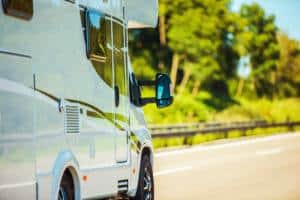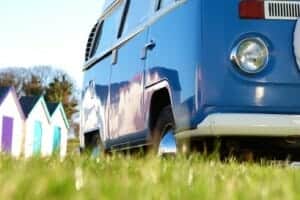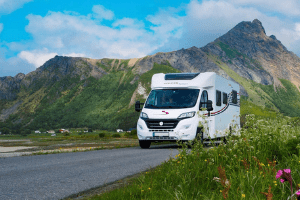Insurance for Self-Build or Converted Motorhomes & Campervans
What is self-build motorhome and campervan insurance?
Self-build motorhome and campervan insurance is a specialist category of coverage that protects a motorhome or campervan you've built or converted yourself.
When it comes to purchasing a motorhome, there are several types you can choose from – including coach-built motor caravans, A Class motorhomes, Low Profile, American motorhomes, campervans and race trucks. For some people, however, there's nothing better than the truly personal experience of building their own motorhome.
By building your own campervan or motorhome from scratch, or converting a standard van into a campervan, you're totally invested in creating the ultimate personalised vehicle. This is what makes it such an exciting project if you've got the time and inclination for it, from sourcing parts from manufacturers to making modifications and eventually driving your self-made vehicle on the road.
If you've self-built or converted your own motorhome or campervan, it’s important to bear in mind that you need insurance for this type of vehicle. And given the bespoke nature of self-built campervans and motorhomes, you need to go to a specialist insurer that can offer coverage that's just as unique as your vehicle.
Motorhome and Campervan Insurance
History of the campervan

View the entire history of the iconic VW Campervan, from its inception in 1947 all the way through to the latest redesign.
Do I need self-build insurance for a motorhome or campervan I've converted or built myself?
If you’ve converted a van into a campervan or built a vehicle from scratch, you’ll need to get the correct form of insurance. And as stated on your V5C form (vehicle logbook), a converted campervan is no longer classified as a standard van – and you need to alter your insurance to reflect this.
Third-party insurance is the minimum level of coverage you need to take your self-built or converted campervan or motorhome on the road – just as with standard motorhome insurance.
However, you’ve likely invested a significant amount of money, time and effort building or making alterations to your vehicle. In this case, you’ll probably want the peace of mind that comes with having your motorhome or campervan protected under a self-build or converted insurance policy that specifically caters to bespoke vehicles.
In addition to this, you'll need to consider that your DIY campervan or motorhome conversion must meet certain criteria to be classed as a campervan or motorhome – and therefore insurable as one.
Does Self-Build Campervan Insurance Cost More?
Costs may increase depending on your personal situation.
The process of quote retrieval is treated on a case by case basis; therefore, costs tend to fluctuate depending on the finer details of each conversion – as some conversions will have different requirements to others.
If you’ve made any changes to your vehicle, it’s important to declare this to ensure you’re sufficiently covered for your specific vehicle. Equally, if you’ve purchased a self-build campervan or motorhome that was already converted prior to purchase, you should let us know before getting a quote as this could also influence the price and level of cover.
It’s also important to bear in mind what changes do and don’t directly qualify as modifications. For example, spray painting your vehicle a different colour probably won’t make any difference to your premium, however, other changes like changing the suspension, engine or steering capacity are likely to impact your insurance.
Either way, it is important to let us know of any changes, big or small, prior to getting a quote for camper conversion insurance.
What are the requirements for a vehicle to be classed as a converted motorhome or caravan?
There are government-enforced criteria that each vehicle needs to meet in order to be classified as a motorhome. These include:
- At least one bed with a minimum length of 6 feet or 1800mm. This can be converted at night from seats used for other purposes during the day but must be permanently fixed within the body of the vehicle (can be made up from other fixed seats within the vehicle).
- A permanently enclosed fixed means of storage, i.e., wardrobe(s), cupboard(s) or locker(s).
- A permanent fixed water installation to be connected to a fixed water storage tank or container.
- Seating arrangements for diners to sit at a table (table may be detachable but must have permanent means of attachment to the vehicle).
- A sketch showing a floor plan of the vehicle's interior.
- A fixed cooking or heating facility powered by gas or electricity (installation must have an engineer's report and/or electricity and gas to be certificated, and in the event of a claim or audit a certificate must be provided).
- Vehicle to be registered as a motor caravan with the DVLA and have an updated V5C, which must be available to supply in the event of a claim or audit.
- A door that provides access to the living accommodation.
- A minimum of one window on each side of the habitation part of the vehicle.
Furthermore, all the features added to the vehicle must be a permanent installation meaning that any further alterations must be compliant with the above criteria. This is especially important when it comes to self-build or converted motorhome or campervan insurance policies because your policy could become void if modifications are made without prior notice.
You can see the full guidance for converting a vehicle into a motorhome on the Department for Transport section of the GOV.UK website.
What Criteria Do I Need to Insure My Self-Built Motorhome?
Here at Comfort Insurance, we appreciate that each motorhome owner is looking for something special when it comes to their vehicle – which is why so many choose to modify their motorhomes or invest in a self-build motorhome or campervan. In order to accommodate these owners, Comfort Insurance offers comprehensive motorhome insurance that can cover modifications made to your vehicle.
However, there is certain criteria that needs to be met before you can be considered for a self-built motorhome insurance policy.
First of all, if you are looking to insure a converted campervan, you need to double check that your conversion qualifies you for campervan insurance (as outlined above).
We also strongly recommend that you notify us of all modifications you have made so that we can provide a quote based on a policy tailor made to suit the requirements of your vehicle.
Vehicles not registered as motorhome/motorcaravan can be considered, but are on a case by case basis and will require photographic evidence (as outlined below) for underwriters to consider in order to make an underwriting decision.
Photographic evidence required a minimum of 5 recent photographs consisting of:
- One showing the front and one of the side of the vehicle with the number plates in full view.
- One showing the rear and the second side of the vehicle, again clearly showing the number plate.
- One of the interior from front to back of the motorhome, one of the interior from the back to the front of the motorhome and one general photo of the overall interior conversion.
Additional photos will be accepted if this helps on the underwriting of the risk, but the minimum of 5 photos must be included in order to be considered.
If you are thinking about modifying your motorhome or even investing in a self-build motorhome, then call us today and see how we can provide you the best cover for your needs!
How Do I Get My Converted Campervan Reclassified?
Once you believe your van-to-campervan conversion is complete from a modification perspective, the next step is to get the vehicle legally reclassified.
Your newly modified vehicle must meet the criteria outlined above to classify as a motorhome. In short, this includes seats and a table, sleeping accommodation, and cooking and storage facilities.
Campervans and motorhomes fall into the DVLA category of motor caravan – and this should be correctly reflected in the vehicle’s V5C logbook. Once the conversion is complete, you must send the logbook back to the DVLA for body type amendment so the vehicle can be identified properly.
You should also send photographic evidence of the new conversion to the DVLA, along with a detailed description and receipts for the work you've carried out, so they can approve the change.
Can I Get Insured on a Part Converted Van or Motorhome?
Unfortunately, we are no longer able to accept home or privately converted vehicles in course of conversion - we can only accept such vehicles once the conversion is complete. Ensure that you have photographic evidence of the conversion set out below prior to inception as they might be requested as part of an audit trial or in the event of a claim.
Please refer any conversion that you are unsure if the meet our policy requirements.
What do I need to get insurance for my self-built or converted motorhome or caravan?
We appreciate that each motorhome owner is looking for something special when it comes to their vehicle – which is why so many choose to modify their motorhomes or invest in a self-build motorhome or campervan. To accommodate these owners, we offer comprehensive motorhome insurance that can cover modifications made to your vehicle.
However, there are certain criteria that you need to meet before you can be considered for a self-build or converted motorhome insurance policy.
Firstly, if you're looking to insure a converted campervan, you need to double check that your conversion qualifies you for campervan insurance (as outlined above).
We also strongly recommend that you notify us of all modifications to your vehicle so we can provide a quote based on a policy tailored to suit your unique requirements.
Vehicles not registered as motorhome/motorcaravan can be considered on a case-by-case basis. We need photographic evidence (as outlined below) for underwriters to consider in order to make an underwriting decision.
Photographic evidence must include a minimum of 5 recent photographs consisting of:
- One showing the front and one of the side of the vehicle with the number plates in full view.
- One showing the rear and the second side of the vehicle, again clearly showing the number plate.
- One of the interior from front to back of the motorhome, one of the interior from the back to the front of the motorhome, and one general photo of the overall interior conversion.
You can include additional photos if this would help underwriters understand your modifications, but you must include the minimum 5 photos for your vehicle to be considered.
If you're thinking about modifying your motorhome or even investing in a self-build motorhome, then call us today on 0208 984 0666 and see how we can provide you the best cover for your needs!
Can I get insurance for a part converted motorhome or campervan?
Unfortunately, we're no longer able to accept home or privately converted vehicles that are in the process of conversion - we can only accept such vehicles once the conversion is complete. Ensure that you have photographic evidence of the conversion set out above prior to your policy starting, as they might be requested as part of an audit trial or if you need to make a claim.
Please get in touch if you're unsure whether your conversion meets our policy requirements.
Why choose Comfort Insurance for self-built or converted motorhome coverage?
Here are just a few reasons why you should choose us for your policy:
- We have more than 30 years' experience in the industry, so we know a thing or two about what makes an exceptional motorhome insurance policy - whether that's self-build, converted or otherwise.
- We're one of the UK's leading motorhome and campervan insurance brokers. In fact, we've won What Motorhome's Insurance Provider of the Year award 10 times.
- We pride ourselves on our penchant for customer service. Don't take out word for it though, just read the thousands of 'Excellent' Trustpilot reviews our previous customers have left us.
- We've built strong partnerships with some of the UK's leading underwriters like Aviva and DAS, so you can rest assured you'll get high-quality coverage you can count on.
We're authorised and regulated by the Financial Conduct Authority under the number 300281.





